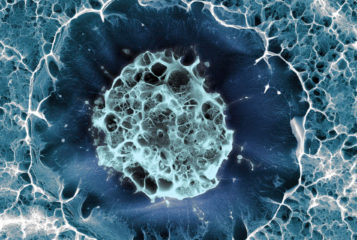A maternal protein in the embryo can cause long-lasting impacts on development, Australian researchers have found.
The protein SMCHD1, from a mother's egg cell, persists after fertilisation in the early embryo and is involved in genomic imprinting – where either the mother or father's version of a particular gene is inactivated, or 'silenced'. The finding could help researchers understand certain genetic and developmental disorders caused by faulty imprinting.
'Studying SMCHD1 in early embryos has uncovered new gene targets that this protein silences,' said senior author Professor Marnie Blewitt, at the Walter and Eliza Hall Institute of Medical Research (WEHI) in Parkville, Australia. 'This could explain how changes in SMCHD1 activity contribute to diseases.'
The study, published in the journal eLife, is the result of a collaboration between researchers at WEHI, the University of Newcastle, the University of Monash and the University of Melbourne, Australia. The team used genomic analysis techniques and fluorescence microscopy to study the effect of maternally-derived SMCHD1 protein in mouse zygotes. They identified ten genes which were switched off or silenced by SMCHD1.
Lead author Iromi Wanigasuriya from WEHI explained: 'Genomic imprinting occurs because of "epigenetic marks" on DNA that impact how genes can be used.' She added: 'When a sperm fertilises an egg, both cells' DNA carries epigenetic marks from the parent to the child.'
The team found that SMCHD1 from the egg could persist in the zygote for five rounds of cell division as the zygote grew. Specifically, SMCHD1 protected epigenetic marks on DNA inherited from the egg and sperm cell from being erased - ensuring that proper gene silencing could occur. In this way, SMCHD1 could instil an 'epigenetic memory' in the embryo.
In most cases, both the paternal and maternal copy of a gene are expressed in offspring cells. However, although relevant for only a small subset of genes, genomic imprinting is a natural process that is crucial for the healthy development of an embryo. While other maternal egg proteins are known to be important for imprinting, this is the first time such a role has been described for SMCHD1.
The findings implicate a role for SMCHD1 in developmental disorders such as Prader-Willi Syndrome, where genomic imprinting is dysregulated. As a result, Professor Blewitt and her team are planning future studies looking at SMCHD1 as a drug target.
She noted that: 'While the effects we discovered were subtle, we know that events occurring in early embryonic development can have long-term effects on health.'
'As well as extending our understanding of genomic imprinting, this research adds an extra dimension to the many ways we know parents can impact their offspring's health.'






Leave a Reply
You must be logged in to post a comment.